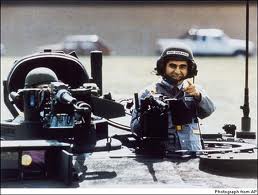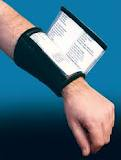Now that my children are grown, I can’t remember the last time I used the word “oops.” Sure – it’s part of my vocabulary, but I have never spent any time considering its various implications. Until of course, last week when Rick Perry was floundering around trying to remember the three US departments that he would eliminate if elected president. He came up with two, and despite helpful prompting from his rivals he could not come up with the third, even after looking at his notes. He gave up and then quietly said “Oops!”
His brain freeze was stunning. After all he was not being tested with “gotcha” questions on obscure foreign policy leaders or domestic issues. I recall the1988 presidential debate between Dukakis and Bush Sr., where Dukakis was asked if he would favor the death penalty if his wife were raped and murdered. One might forgive Dukakis for fumbling and stumbling on this question, but instead he gave a composed answer stating that he had always opposed the death penalty. Although you would think that Americans would value composure in their president, his response was widely criticized as being too dispassionate. This incident, coupled with the ridiculous picture of him looking like Rocky the flying squirrel posing as a tank commander, doomed his campaign.
In contrast, Rick Perry was in autopilot debate-speak, reeling off examples of how he would downsize the federal government. That Perry would forget one of the fundamental principles of his domestic agenda was egregious enough, but it was that added Oops! that sent comedians into rapturous delight.
So what is the meaning of Oops! and where did it come from, and is it a purely American phrase, or is this word used universally across multiple languages and cultures? According to Slate magazine, Oops did not enter our lexicon until the 1930s, where it was used to signify an apology for a blunder. The word is probably a contraction of the childhood phrase “Up-a-Dazy, which can be traced back to Jonathon Swift (of Gulliver’s Travels fame), which then evolved into the more familiar “Oops-a-Daisy, and from there to the  free standing Oops!. Its use with children is pretty clear – it describes a trivial accident, like spilling milk. Putting your hand to your lips reinforces the concept. In fact, if a parent says Oops! to a child, the child is reassured that there will be no recriminations – no harm no foul.
free standing Oops!. Its use with children is pretty clear – it describes a trivial accident, like spilling milk. Putting your hand to your lips reinforces the concept. In fact, if a parent says Oops! to a child, the child is reassured that there will be no recriminations – no harm no foul.
My bilingual friends have suggested that some variations of Oops! are used in other languages. For example, in Hindi the equivalent is Oh-ho (with a downward inflection), in Portuguese, it is Opa Opa. Germans and Poles say Oopala. But the consistent feedback I got is that regardless of language, we routinely punctuate our blunders with a heart felt Shit! However, I would argue that Shit! is nuanced – it comes with an element of annoyance or frustration. When we spill milk, we say Shit!, not because we are out of the range of tender ears, but because now we have to clean up the mess. Compared to Oops!, Shit! lacks the no harm/no foul connotation.
Back in my college days before word processors, a typo would prompt a multitude of “Shits!” since I would have to retype a whole page or get meticulously creative with the White Out. Now with spell check, a typo only prompts an Oops! In contrast, when the computer crashes and I lose an entire document, I let loose with a torrent of Shits! plus other well chosen words. There is one additional small niche for the adult Oops! It describes a blunder that is cute or amusing – farting in bed is the best example. “Oops, sorry,” followed by tittering, exaggerated P.U’s and flapping of sheets.
The teenage pop singer Britney Spears shot to fame with the song “Oops, I Did it Again,” and it is interesting to dissect the lyrical implications of the word. The song starts with a series of Yeah, Yeah, Yeah, Yeahs and then she says:
“Oops, I did it again, I played with your heart, got lost in the game, Oh baby, Oh baby.
To me the word Oops! implies that the singer is a young child. Indeed Britney sings with a baby doll voice suggesting pure innocence, a young girl who is still unaware of her effect on men. I remember sitting at a dinner table once with some men my age. A bevy of coltish teenagers walked in wearing cute little skirts and tank tops, which they repeatedly yanked up, sometimes in unwitting unison. The man next to me said, “There is just a certain something about teenage girls that is so charming. They just have no idea what sort of vibe they are giving off.” I agreed, their innocence was delightful to watch. “They lose that something when they hit 18,” he continued. “The innocence is usually gone by then.” Oops.
However, Oops does a 1800 in the next verse:
“Oops – you think that I’m in love, think that I’m sent from above, but I’mnot that innocent.”
Here Britney is no longer the innocent child, she has become the vixen. Although she may be breaking a man’s heart, she dismisses the situation by saying, Oops! The addition of Oops! has trivialized love. No harm/no foul on her part, and so what if the man got the wrong impression? That’s his issue to deal with.
So here is another role for the adult Oops – it trivializes a mistake. When Rick Perry said Oops! could he possibly have thought he could pass the whole moment off as an innocuous brain freeze? I can imagine the frenzy in Perry’s backstage war room during that sickening minute as he flailed around on stage. His advisers at first stared in disbelief, and then as agonizing seconds ticked by, they turned and retched in the corner wastebasket. Somehow they would have to explain how the next leader of the free world could not remember the cornerstones of his campaign. Forty more excruciating seconds ticked by as the hole got deeper, and then the advisers saw Perry shrug his shoulders and say Oops! Now they would have to additionally explain why Perry thought that his blunder was only a trivial mistake.
Certainly Americans expect that their president can keep more than three things in his mind at once. Perry also looked down at his notes for help, but his advisers probably did not think that it was necessary to give him crib notes for his basic campaign strategy. It would have been like giving him crib notes for the names of his wife and children. Instead, his notes probably addressed easily forgettable names that have been the mainstay of gotcha questions – like countries and their presidents. Just the week before, Herman Cain had referred to Uzbekistanas Uz Beki Beki Beki Stan Stan, casually dismissing the former Soviet state as totally irrelevant. Or perhaps Perry’s notes provided him with a map of the Middle East, so he would not mistake Libya for Syria. Personally, I think that the President should be able to keep not only three, but dozens of lists in his mind. I would hold the President to a higher standard than, say, a football quarterback. The quarterback is being paid the big bucks to memorize all of the plays– that’s why they call it a “skill position.” Therefore, I am always disappointed when the quarterback gets into the huddle and checks the crib notes taped to his arm.
Clearly Oops! was not the optimal word – it falls hopelessly short of the required presidential gravitas. But then I thought, what should Perry have said? I bet that a heartfelt Shit! or even Fuck! was on the tip of his tongue, and perhaps he deserves credit for stifling two of George Carlin’s words that you can never say on television. Part of the problem might be that our vocabulary lacks a suitable word that acknowledges a mistake and takes responsibility for it – something north of Oops! and slightly south of Shit! Okay, well how about Darn!? This word occupies the same niche and Oops, but is not as cute. “Uh-Oh” is also a poor choice because it implies an oncoming disaster and thus was not compatible with the damage control launched the next day. His advisers apparently saw no noble or presidential way out of the hole, so they continued with the Oops! strategy. His subsequent appearance on the David Letterman show, and in the next Republican debate, continued to trivialize the mistake by playing it for laughs. It’s totally different in football – in the post game press conference, the coach, the quarterback or the defense somberly admit their mistakes, and promise to better next time. There is no Oops! in football.
There are a couple of other professions where a ready admission of a mistake is ill-advised. Airline pilots for example – if there is a very rough, but safe, landing the pilot will not come on intercom and say “Oops! I forgot to put up the flaps as I landed.” Surgeons are another example – an Oops! can lead to a law suit. I remember sewing up my first episiotomy in medical school. I put in an ill-placed stitch and said “Oops!” I simply removed it and put in a better one. No harm/No foul. Afterwards the attending took me aside and said, “Please listen to this advice. Never, ever, ever, say Oops unless the patient is under general anesthesia.”
The missing words in the following poem are anagrams (i.e. share the same letters like spot, stop, post) and the number of asterisks indicates that number of letters. One of the words will rhyme with the previous or following line. Your job is to solve the missing words based on the above rules and the context of the poem. Scroll down for answers.
American watched in fascinated horror as Perry started to blither
And before our eyes a presidential campaign start to shrivel and ******
Backstage, his advisers were horrified and they couldn’t believe their eyes.
They began to ****** in agony as each painful second ticked by
Their knuckles turned ****** and they all wanted to up chuck
But when Perry said Oops! they knew that they were shit out of luck.
*
*
*
*
*
*
*
*
Answers: Wither, writhe, whiter
Follow Liza Blue on:Share:



